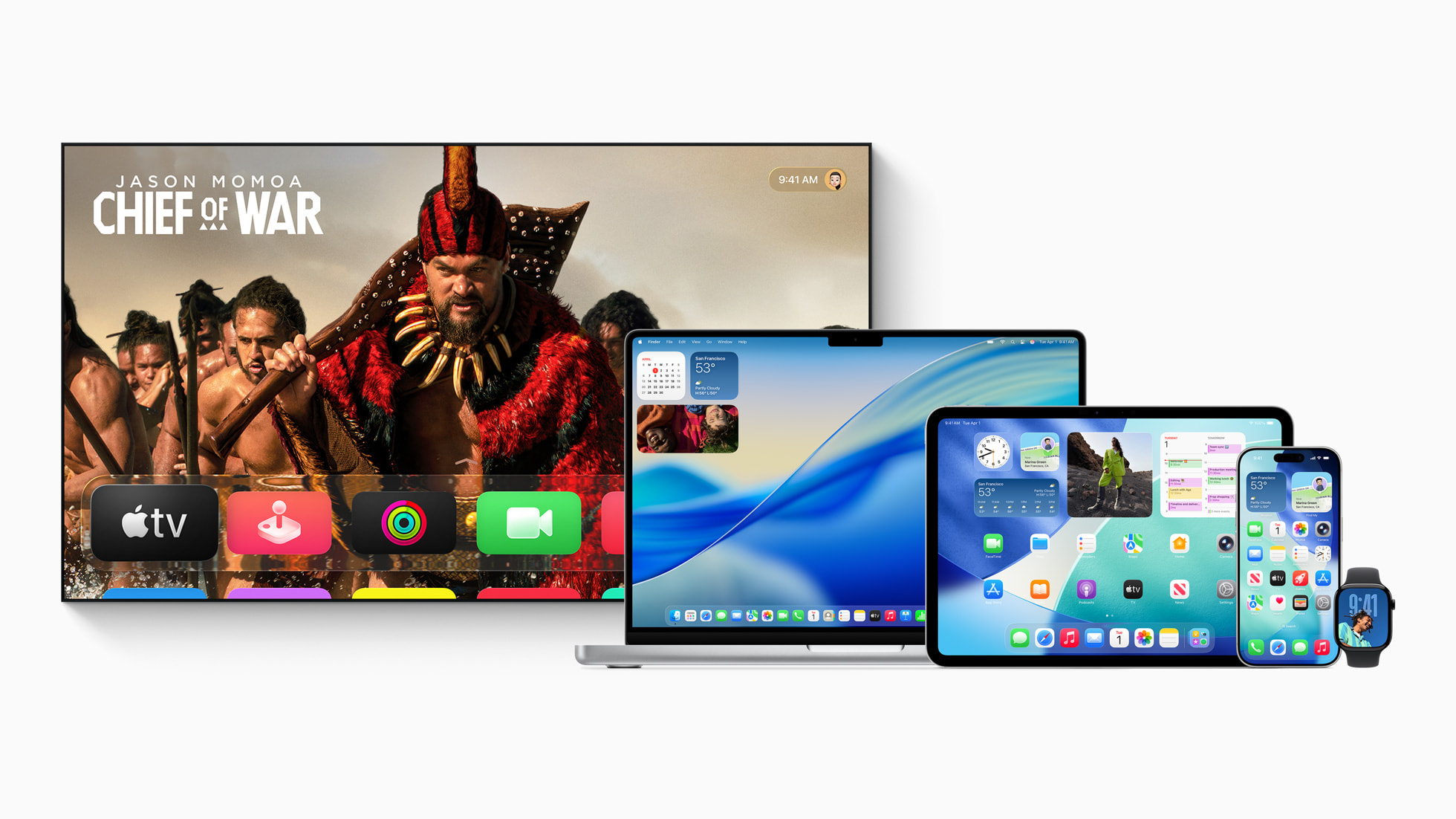Apple trapped me in their ecosystem — and I love it
October 13, 2025 by
Max van IJsselmuiden
Apple won, not because they made the best individual products, but because they made the best system.

Image: Apple
Over a decade ago I was a PC-building, Windows-gaming, open standards, Android advocate. I scoffed at Apple's walled garden. Then I bought an iPhone, followed by a MacBook for my studies. Now I own more Apple devices than you can count on two hands and I get it: Apple won.
Not because they made the best individual products, but because they made the best system. Here are some examples throughout my day.
A day in the life
I wake up with my Apple Watch. My iPhone brings me the news, and shows me the analysis of how well I slept (sometimes). I ask Siri via my HomePod to turn on the lights. At work from home days, I turn on my Mac Mini — and start work on my Studio Display. When I sit down at my desk and turn on the Mac, the Mac unlocks since I'm wearing my Apple Watch. I join meetings using the camera in the display and my AirPods Pro.
Whenever I've read something interesting on my phone, a small notification pops up in the Dock on my Mac. Essentially the system goes 'do you want to continue here?'. If I click it, the article opens up. All thanks to what Apple calls Handoff.
Similarly, whenever I need to transfer a bit of text between my computer and phone, I copy it on one device, and paste to the other. If I switch from using my Mac to listening to a podcast on my phone, my AirPods transition to my phone.
If I need to make a sketch for work, I use Freeform with the iPad and Apple Pencil. The sketch is automatically synchronised and I can use it on my Mac. I could also place my iPad next to my computer, move my mouse towards it to control the iPad, allowing me to drag the sketch to the Mac and continue. Feels like magic.
If I lose my keys or wallet, I can use my watch, phone or Mac to locate them with the AirTag.
Whenever I watch a show, I turn on my TV with the Apple TV remote. If it's late at night, I take out my AirPods and the TV requests 'Press {button} to connect'. If not, the HomePods play the TV sound.
If somebody rings my doorbell, it pops up on my phone, watch, Mac or TV. Not all at once, just whichever device is closest to me. On all the devices, I can view the video, and talk to the person standing in front of my door.
If you take away all these products and replace them with solutions from different brands, the ease-of-use would be reduced drastically. I love using these products, and when they work together it's a great experience. This is what I'm paying for.
The lock-in
Looking at individual devices in isolation misses what makes this work. Other companies might have made better phones, tablets, earbuds, speakers, media boxes, and so forth. However, when looking at it holistically, you lose the perks of these devices 'working together'. You lose the perks of the system.
If Samsung releases a phone that's objectively better, what then? I'd lose my iCloud photos - not just the storage, but the seamless synchronisation across devices. I'd have to reinstall my apps, sure, but then what? I'd lose the seamless transition with my AirPods, the universal clipboard, the Handoff magic. No more AirDrop. What do I do with my Apple Watch?
Different earbuds? OK, but forget about the continuity features.
Different laptop? Never (although Liquid Glass is a big dent).
Different tablet? Forget about the 'magic' interactions.
When a better product doesn't disrupt the system, I'll switch. I use a Keychron keyboard because I love how it types. I have a Logitech mouse because I hate the Magic Mouse (though I keep an Apple Trackpad next to it). These choices don't break the magic, so I'm comfortable making them.
Other companies are trying to build their own ecosystems. Google and Samsung are catching up. But Apple's been doing this for a long time and it shows. The question is whether the lock-in delivers enough value to justify the premium. For me, it does.
Thank you for reading. Have a good day.
Did you like this post?
Older
October 9, 2025
Atomic Habits by James Clear is useful, but it's longer than it needs to be. I've written a cheat sheet with the core principles that actually matter, condensed to one page.
Want to stay tuned?
Apple trapped me in their ecosystem — and I love it
October 13, 2025 by
Max van IJsselmuiden
Apple won, not because they made the best individual products, but because they made the best system.

Image: Apple
Over a decade ago I was a PC-building, Windows-gaming, open standards, Android advocate. I scoffed at Apple's walled garden. Then I bought an iPhone, followed by a MacBook for my studies. Now I own more Apple devices than you can count on two hands and I get it: Apple won.
Not because they made the best individual products, but because they made the best system. Here are some examples throughout my day.
A day in the life
I wake up with my Apple Watch. My iPhone brings me the news, and shows me the analysis of how well I slept (sometimes). I ask Siri via my HomePod to turn on the lights. At work from home days, I turn on my Mac Mini — and start work on my Studio Display. When I sit down at my desk and turn on the Mac, the Mac unlocks since I'm wearing my Apple Watch. I join meetings using the camera in the display and my AirPods Pro.
Whenever I've read something interesting on my phone, a small notification pops up in the Dock on my Mac. Essentially the system goes 'do you want to continue here?'. If I click it, the article opens up. All thanks to what Apple calls Handoff.
Similarly, whenever I need to transfer a bit of text between my computer and phone, I copy it on one device, and paste to the other. If I switch from using my Mac to listening to a podcast on my phone, my AirPods transition to my phone.
If I need to make a sketch for work, I use Freeform with the iPad and Apple Pencil. The sketch is automatically synchronised and I can use it on my Mac. I could also place my iPad next to my computer, move my mouse towards it to control the iPad, allowing me to drag the sketch to the Mac and continue. Feels like magic.
If I lose my keys or wallet, I can use my watch, phone or Mac to locate them with the AirTag.
Whenever I watch a show, I turn on my TV with the Apple TV remote. If it's late at night, I take out my AirPods and the TV requests 'Press {button} to connect'. If not, the HomePods play the TV sound.
If somebody rings my doorbell, it pops up on my phone, watch, Mac or TV. Not all at once, just whichever device is closest to me. On all the devices, I can view the video, and talk to the person standing in front of my door.
If you take away all these products and replace them with solutions from different brands, the ease-of-use would be reduced drastically. I love using these products, and when they work together it's a great experience. This is what I'm paying for.
The lock-in
Looking at individual devices in isolation misses what makes this work. Other companies might have made better phones, tablets, earbuds, speakers, media boxes, and so forth. However, when looking at it holistically, you lose the perks of these devices 'working together'. You lose the perks of the system.
If Samsung releases a phone that's objectively better, what then? I'd lose my iCloud photos - not just the storage, but the seamless synchronisation across devices. I'd have to reinstall my apps, sure, but then what? I'd lose the seamless transition with my AirPods, the universal clipboard, the Handoff magic. No more AirDrop. What do I do with my Apple Watch?
Different earbuds? OK, but forget about the continuity features.
Different laptop? Never (although Liquid Glass is a big dent).
Different tablet? Forget about the 'magic' interactions.
When a better product doesn't disrupt the system, I'll switch. I use a Keychron keyboard because I love how it types. I have a Logitech mouse because I hate the Magic Mouse (though I keep an Apple Trackpad next to it). These choices don't break the magic, so I'm comfortable making them.
Other companies are trying to build their own ecosystems. Google and Samsung are catching up. But Apple's been doing this for a long time and it shows. The question is whether the lock-in delivers enough value to justify the premium. For me, it does.
Thank you for reading. Have a good day.
Did you like this post?
Older
October 9, 2025
Atomic Habits by James Clear is useful, but it's longer than it needs to be. I've written a cheat sheet with the core principles that actually matter, condensed to one page.
Want to stay tuned?
